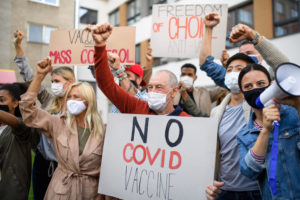
With the U.S. Covid vaccination rate slowing down, some employers have begun to issue mandates requiring their employees to be vaccinated. Vaccines in the workplace can create challenges for employers, the Occupational Safety and Health Administration (OSHA) records and workers’ compensation claims.
Workers’ compensation insurance exists to protect those who are injured at work. Under Florida’s workers’ compensation law, you will not face a jury and a judge or receive damages for pain and suffering. Still, you can receive medical benefits and be compensated for missed work. So what happens if you experience an injury after getting a COVID-19 vaccine for work? Let’s explore this topic further.
COVID Vaccine Side Effects & OSHA Reporting
You may be wondering what is OSHA and how does it affect you as an employee? OSHA is a regulatory agency of the United States Department of Labor designed to ensure safe working conditions for workers. Federal law entitles you to a safe workplace. If your employer doesn’t provide a workplace free of known health and safety hazards, you have the right to speak up about hazards without fear of retaliation. If possible, you should tell your employer about your concerns, but you may file a confidential complaint with OSHA if you’re ignored.
With the pandemic, there were many questions regarding workplace safety. OSHA provided guidance for employers and employees on how to prevent the spread of COVID-19 in the workplace. However, a more recent concern for employers was what to do if employees have adverse reactions to receiving a COVID vaccine.
One way OSHA learns how it can protect the health and safety of the American workforce is by requiring most employers with 10 or more full-time employees to keep a yearly log of all work-related injuries and illnesses. For many employers, there was some confusion over how to record employees who have adverse COVID vaccine reactions on their OSHA logs. As with most things COVID-related, this situation is in flux and required clarification.
Any illness or injury that requires medical treatment or a day off of work usually needs to be recorded in OSHA logs. However, in May, OHSA issued a directive, clarifying guidance on how to record employees with adverse COVID vaccine reactions with this statement:
“DOL and OSHA, as well as other federal agencies, are working diligently to encourage COVID-19 vaccinations. OSHA does not wish to have any appearance of discouraging workers from receiving COVID-19 vaccination, and also does not wish to disincentivize employers’ vaccination efforts. As a result, OSHA will not enforce 29 CFR 1904’s recording requirements to require any employers to record worker side effects from COVID-19 vaccination through May 2022. We will reevaluate the agency’s position at that time to determine the best course of action moving forward.”
At least through May of 2022, employers do not need to record adverse reactions from COVID-19 vaccines on their OSHA logs. This directive applies to employers no matter if vaccines are mandatory or optional for workers.
Adverse Vaccine Reactions & Workers’ Comp
Further clarity in regards to COVID vaccines in the workplace was released in conjunction with the U.S. Equality Employment Opportunity Commission (EEOC). Employers may ask employees whether they have received the COVID vaccine, but the conversation between employer and employee should stop there. Proof of vaccine or reasons why the employee is choosing not to receive the vaccine is not permitted. Reasonable accommodations must be made for employees who hold religious objections to vaccines. If an employee is disabled and unable to receive a vaccine, accommodations must be made.
If an employer partners with a healthcare provider or third party to provide voluntary COVID vaccines to its employess, there is some discussion on whether the COVID vaccine adverse reaction would fall under workers’ compensation. Some believe that if an employee voluntarily gets the COVID vaccination, it wouldn’t result in a worker’s comp claim. However, others believe that some workers’ compensation statutes cover injuries from vaccines administered as part of a government-sanctioned vaccination program.
Should a worker have an adverse reaction to the COVID vaccination, workers compensation claims would have to consider the following on whether a claim would be paid:
- Whether the vaccine is strongly encouraged, voluntary or required,
- The vaccine was administered during company time or the employee’s personal time,
- The vaccine was administered on company property or offsite, and
- An employer provides or covers the cost of the vaccine.
Related: Does Workers’ Compensation Cover Covid-19
As COVID continues to evolve, the policies and procedures that businesses must follow, especially related to workers’ health and safety, must continue to evolve. As more was learned about COVID-19, adjustments like the wearing of masks and handwashing were advised. With the arrival of vaccinations, determining who is responsible should a person have an adverse reaction to receiving the vaccine can be complicated.
If you or a loved one have received a COVID vaccine in a Florida workplace and experienced an adverse reaction, know that you may have legal avenues to explore. Consider contacting a qualified workers’ comp attorney who has experience navigating the difficult worker’s compensation system. The Scott R. Marshall Law Firm has been fighting for injured Florida workers and their families since 1997. Contact us online or call (727) 772-5900 for a free consultation.

At the Scott R. Marshall law firm, we represent people around Florida in claims arising out of workers’ compensation, personal injury and wrongful death. Our firm believes the best way to represent clients is to take the time to get to know them. We deal directly with our clients on all legal issues and provide professional, personal and aggressive representation.















Comments for this article are closed.